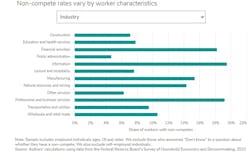Construction and design firms struggling to stay staffed up and competitive may have a new source of worry: the probable end of non-compete agreements.
The U.S Federal Trade Commission’s recent issuance of a final rule banning most such pre-employment arrangements, which restrict an employee’s ability to move to a competitor, could complicate efforts to retain and invest in workers and protect proprietary company information. Taking that control from construction contractors and companies that design and engineer projects they build could exacerbate talent shortages both are experiencing.
The FTC action set in motion the final stretch to implementation in September and also triggered legal challenges, the primary one being a lawsuit filed by a coalition of firms led by the U.S. Chamber of Commerce seeking an injunction. Associated Builders and Contractors (ABC) and Independent Electrical Contractors Association are part of the coalition.
Non-compete agreements are far from widespread, but not uncommon in some industry sectors. One may be professional services, which includes engineering. A 2023 analysis of recent research on non-competes by the Federal Reserve Bank of Minneapolis estimated they covered 19.2% of professional and business services employees, trailing only those in the information sector. The construction sector was at the low end of a dozen industries, at 7.1%,(See chart, below), and also lower than overall adult workforce coverage, estimated at 11.4%. Non-competes also skew higher among workers making more than $100,000 annually and among college graduates.
Construction contractor interests have weighed in on the matter of non-competes since the preliminary rule was issued in 2023. In a letter to the FTC chairman in April 2023, ABC noted that about 41% of its members surveyed in 2022 used non-competes. Nearly a third said all executives were covered, while 18% said specific ones were. Another 21% said all or nearly all employees were; 18% said all equity recipients were; and 17% said other select associates, such as in sales, were. The survey revealed many companies, most small businesses, relied heavily on non-competes to protect their investments and anticipated negative impacts from a ban that would “have a harmful effect on their companies as well as their employees and force companies to rethink their compensation and talent strategies.”
The loss of non-competes could be a significant blow to construction contractors, according to an attorney with Stoel Rives LLP. Andrew Gibson, who specializes in the construction sector, wrote in a piece appearing in the Daily Journal of Commerce that many contractors have come to lean on them selectively for their ability to preserve their competitive edge. They help justify and secure investments in employee training, enable the building of strong customer relationships and prevent dissemination of intellectual property assets like safety programs, customer preferences, bidding and estimating strategies, profitability data, and trade secrets.
“The proverbial law of unintended consequences will force companies up and down the line of the construction industry – material suppliers, subcontractors, general contractors, developers, and design professionals – to all grapple with the new rule’s impacts and pursue alternative means to protect valuable building blocks on which they’ve built their businesses,” Gibson wrote.
Another attorney specializing in construction, Kylee Evans, with Fabyanske, Westra, Hart & Thomson, Minneapolis, writes in a 2023 analysis, "How Minnesota’s New Ban on Non-Compete Agreements Could Affect the Construction Industry", that construction has adopted non-competes for both high- and low-skilled workers and that their use is “quite common.” They can make sense for rank-and-file employees like estimators, she says, who “tend to be industry experts with experience and have access to competitive bidding information, pricing strategies, and other proprietary information. Many construction companies used non-competes to protect this proprietary information.”
Defense of FTC’s ban on non-competes centers on the fundamental unfairness of lashing workers to their employers and, in turn, restricting growth and innovation in industry. Employers, the FTC and opponents of non-competes say, have an array of other tools, such as non-disclosure agreements, at their disposal to keep valuable employees in the fold and prevent valuable company secrets leaving with workers. Additionally, eliminating non-competes would create a new level playing field that would give all businesses freer access to a broad worker pool.
An FTC news release announcing the final rule said “Noncompete clauses keep wages low, suppress new ideas, and rob the American economy of dynamism, including from the more than 8,500 new startups that would be created a year once non-competes are banned,” said FTC Chair Lina M. Khan. “The FTC’s final rule to ban non-competes will ensure Americans have the freedom to pursue a new job, start a new business, or bring a new idea to market.”
About the Author
Tom Zind
Freelance Writer
Zind is a freelance writer based in Lee’s Summit, Mo. He can be reached at [email protected].

